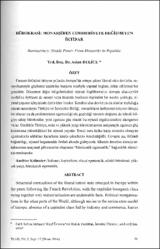| dc.contributor.author | Delice, Aslan | |
| dc.date.accessioned | 2014-09-16T09:01:54Z | |
| dc.date.available | 2014-09-16T09:01:54Z | |
| dc.date.issued | 2014-04 | |
| dc.identifier.citation | DELİCE, Aslan. "Bürokrasi: Monarşiden Cumhuriyete Değişmeyen İktidar." Türkiye Adalet Akademisi Dergisi, 5.17. (2014): 41-61. | en_US |
| dc.identifier.uri | https://hdl.handle.net/11352/2046 | |
| dc.description.abstract | Fransız ihtilalini izleyen yıllarda Avrupa'da ortaya çıkan liberal ulus devletin, sanayileşmeyle güçlenen kapitalist burjuva sınıfıyla yapısal bağları inkar edilemez bir gerçektir. Dünyanın diğer bölgelerindeki siyasal örgütlenmeler Avrupa ulus-devlet modeline öykünse de sanayi veya ticaretle beslenen kapitalist bir sınıfın yokluğu, siyasal yapının işleyişinde derin izler bırakır. Kendini ulus devlet ya da uluslar topluluğu
olarak tanımlayan Türkiye ve Sovyetler Birliği, monarkların tasfiyesini izleyen süreçte bir ulusun ya da proleteryanın egemenliği ele geçirdiği sanısını doğursa da teknik bilgiye sahip bürokratlar, yeni egemen güç olarak bu siyasal örgütlenmelere damgasını vurur. Özellikle Türkiye, ordu ve yüksek yargı bürokratlarının anayasayla egemen güç konumuna yükseldikleri bir siyasal yapıdır. Temel soru halka karşı sorumlu olmayan
egemenlerin aldıkları kararların kimin çıkarlarını öncelediğidir. Cevapta şu; iktisadi bagımlılığı, siyasal bagımsızlık örtüsü altında gizleyerek, ülkenin denetim altında tutulmasının anayasal güvencesini oluşturan "bürokratik egemenlik," bağımlılık sürecinin teminatıdır. | en_US |
| dc.description.abstract | Structural connections of the liberal nation state emerged in Europe within the years following the French Revolution, with the capitalist bourgeois class rising together with industrialisation are undeniable facts. Political reorganisations in the other parts of the World, although envies to the nation state model of Europe, absence of a capitalist class fed by industry and commerce, leaves deep traces in the process of the political structure. Although Turkey and the Soviet Union, describing themselves as nation states or the union on nations during the process of elimination of the monarchs, may give the impression that a nation or proletarians captured the sovereignty; in fact, bureaucrats with technical knowledge leave their mark on in such political reorganisations as sovereign powers. Especially, Turkey is a political structure in which the army and supreme judicial bureaucrats has risen to the status of sovereign power under the Constitution. The fundamental question is whose benefits are prioritised by the decisions adopted by the sovereigns not responsible against the people. The answer is this: "bureaucratic sovereignty" creating the Constitutional
surety of economic control by hiding the economic dependence under the sheets of political independence is the assurance of the economic dependence. | en_US |
| dc.language.iso | eng | en_US |
| dc.publisher | Türkiye Adalet Akademisi | en_US |
| dc.rights | info:eu-repo/semantics/openAccess | en_US |
| dc.subject | Saltanat | en_US |
| dc.subject | Kapitalizm | en_US |
| dc.subject | Ulusal Egemenlik | en_US |
| dc.subject | Silahlı Bürokrasi | en_US |
| dc.subject | Yüksek Yargı | en_US |
| dc.subject | Bürokratik Egemenlik | en_US |
| dc.subject | Sultanate | en_US |
| dc.subject | Capitalism | en_US |
| dc.subject | National Sovereignty | en_US |
| dc.subject | Armed Bureaucracy | en_US |
| dc.subject | Supreme Judiciary | en_US |
| dc.subject | Bureaucratic Sovereignty | en_US |
| dc.title | Bürokrasi: Monarşiden Cumhuriyete Değişmeyen İktidar | en_US |
| dc.title.alternative | Bureaucracy: Steady Power From Monarchy to Republic | en_US |
| dc.type | article | en_US |
| dc.relation.publicationcategory | [0-Belirlenecek] | en_US |
| dc.contributor.institutionauthor | Delice, Aslan | |



















